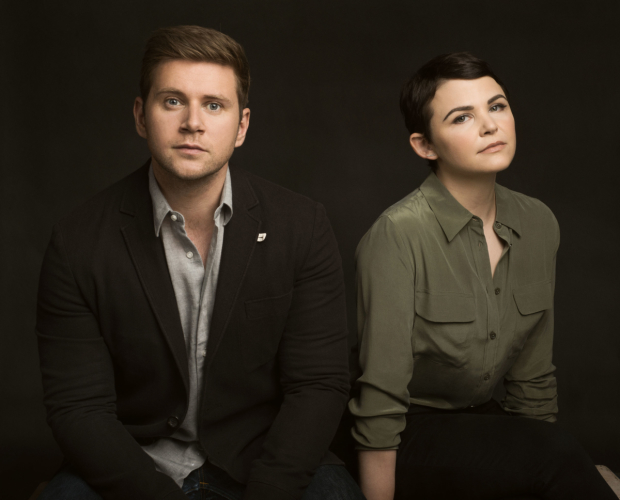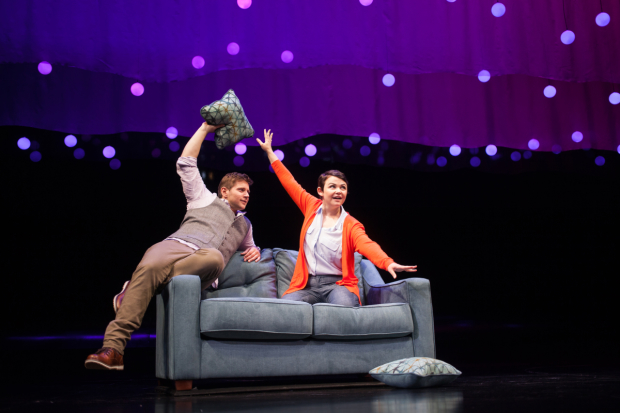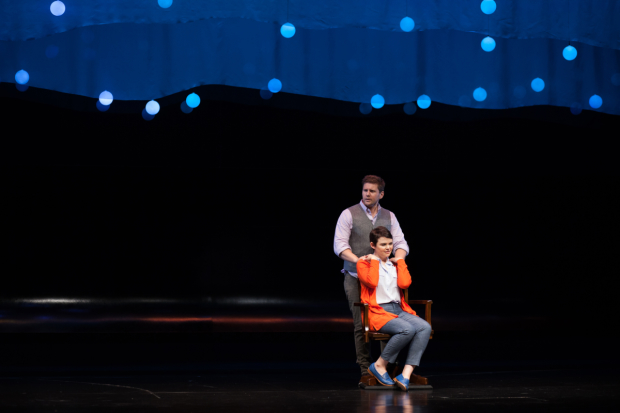Ginnifer Goodwin and Allen Leech Travel the Multiverse in Constellations
A pair of TV regulars find infinite possibilities in their theatrical homecoming at the Geffen Playhouse.
For the past six years, Ginnifer Goodwin has been living in the mystical town of Storybrooke, Maine, as Snow White in the ABC series Once Upon a Time, while Allen Leech spent half a decade in the company of early 20th-century British aristocracy as Tom Branson in the PBS series Downton Abbey. Television and film have provided both with a variety of immersive worlds to live and play in, but their universe has infinitely expanded onstage at the Geffen Playhouse where they now costar in Nick Payne's dramatic two-hander Constellations, directed by Giovanna Sardelli.
The 80-minute play is built on the scientific theory of the multiverse — a hypothetical (and infinite) set of alternate universes that exist parallel to the one we recognize as our own. In a handful of these cosmic variations, we follow possible trajectories of the relationship between beekeeper Roland (Leech), and theoretical physicist Marianne (Goodwin), an expert in this slice of quantum mechanics. Goodwin, who is admittedly "obsessed with quantum mechanics," is excited at the prospect of Los Angeles audiences leaving with a little more information on the subject. But as she and Leech agree, doing justice to the beautiful and tragic love story of this pair of cosmically linked individuals remains the top priority. "The subject matter couldn't be more intense and emotional," says Goodwin. "There's a lot of tea during rehearsal and a lot of wine after rehearsal."

(© Luke Fontana)
This interview has been condensed and edited for clarity.
Both of you have spent the majority of your careers in TV and film. What made each of you decide to seek out a piece of theater?
Allen Leech: I was actually sitting down with one of Ginny's costars from her show Once Upon a Time, Jennifer Morrison, and she was telling me that Ginny was doing this play. I'd seen it on the West End and she said, "I don't know if they cast the lead." So I got on immediately with all my reps and said, "Please, please, please, get me a meeting for this." I'm a huge fan of the play, and I've also been a fan of Ginny's work for many years. I was lucky enough then to sit down with Gio [Giovanna Sardelli] the director and Ginny said she wasn't too appalled at the idea and that's why I'm here.
Ginnifer Goodwin: I was homesick for theater. I haven't done a play in many years. I moved to L.A. pretty early on, and I feel like that part of myself has gotten away from me somehow. On top of that, I was looking for a different kind of challenge creatively than I've had in the past 10 years — and certainly found it in this play. I was obsessed with Constellations and stalked everyone at the Geffen to get the role, and still, having read it a million times, I don't think I quite understood what I was getting myself into.
What was it about the play that caught your eye?
Ginnifer: I don't think I've ever had so many questions after reading a play. I have a notebook full of questions instead of answers, and I find that really inspiring. Finding ways to infuse the spaces in between the things that I understand and don't understand with truth is so creatively satisfying.
I've read you're also a quantum physics enthusiast. Is that true?
Ginnifer: Yeah, I'm a geek. I keep offering to explain things to anyone who will listen. And they're like, "Nope, that's OK."
Allen: In another universe, I think you are a physicist and a lecturer.
Ginnifer: That's amazing! Thank you!

(© Chris Whitaker)
For much of the play, the two of you are repeating the same dialogue but with different deliveries. Is that a fun challenge as an actor?
Ginnifer: It really is the actor's dream. Whenever someone asks me the question, "If I could have a superpower what would it be?" I always genuinely answer that I wish I could see all of my work in completion and then go back do it differently. And I feel like this play is that opportunity for an actor. It kind of caters to our being self-indulgent — getting to try everything in a million different ways. It's really very creatively satisfying — but exhausting.
Allen: And Gio's been amazing — allowing us that room and that freedom to play, to try things out. We have a really lovely rehearsal space where we can fail and fail again.
We see Roland and Marianne exist in dozens of different universes, but in each one, they seem to remain the same people at their core. What are some of those consistent qualities you've found in each of your characters?
Allen: Given what he does for a living — he's a beekeeper — Roland is very grounded, he's very earthy, and he's very connected emotionally. He's a caretaker in his profession, and he's also a caretaker within his relationship. I think that's something that certainly goes through the whole play. And I mean, obviously he's gorgeous. [laughs]
Ginnifer: I feel like they're opposites in many ways. Marianne compartmentalizes all of her emotions. She's something of a control freak, which maybe from the outside makes her seem goofy and quirky, but it's really just an obsession with possibility — and possibility does free her up. But at the same time she hides behind her intelligence. She does value herself for that, which I admire and love about her, but she definitely uses it as a shield.
Is the theory of the multiverse comforting to either of you?
Ginnifer: That's the word I have always used when it comes to the multiverse theory — that it is "comforting." Because there's no such thing as a past, present, or future — because everything is always happening at once — that means that all life exists and doesn't exist at the same time. I found that that left room for the possibility that everything and everyone that I have ever and will ever know and love always exists and doesn't exist at the same time. And I love that idea. I find it to be very freeing.

(© Chris Whitaker)








